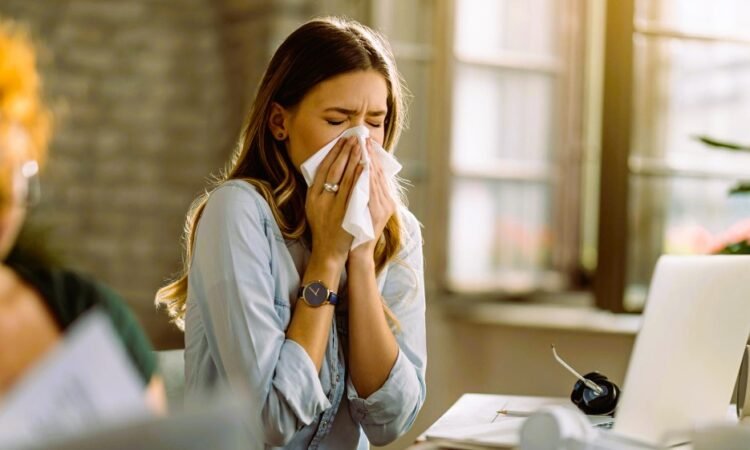
Using herbs and tea can be a natural and effective way to support your immune system and alleviate allergic reactions during the winter season. Here are some tips:
Using Herbs for Allergic Reactions:
Nettle Leaf (Urtica Dioica):
- Nettle leaf is known for its anti-inflammatory properties. It may help reduce allergic reactions. You can brew nettle leaf tea or find nettle supplements in health food stores.
Quercetin-Rich Foods:
- Quercetin is a natural antioxidant that may help stabilize cells and reduce histamine release. Foods rich in quercetin include onions, apples, berries, and kale.
Ginger (Zingiber Officinale):
- Ginger has anti-inflammatory properties and may help alleviate allergy symptoms. You can brew ginger tea or add fresh ginger to your meals.
Turmeric (Curcuma Longa):
- Turmeric contains curcumin, which has anti-inflammatory and antioxidant properties. You can add turmeric to your meals or brew turmeric tea.
Butterbur (Petasites Hybridus):
- Butterbur is an herb that may help relieve allergy symptoms. It’s available in supplement form, but consult a healthcare professional before use.
Herbal Teas for Immune Support:
Echinacea Tea:
- Echinacea is believed to stimulate the immune system. Brew echinacea tea by steeping dried echinacea root or leaves in hot water.
Peppermint Tea:
- Peppermint is known for its soothing properties and may help with congestion. It’s also a natural decongestant.
Chamomile Tea:
- Chamomile has anti-inflammatory and calming properties. It can help relax and support the immune system.
Elderberry Tea:
- Elderberry is rich in antioxidants and may help boost the immune system. You can brew elderberry tea using dried elderberries.
Lemon and Honey Tea:
- A simple combination of lemon and honey in hot water can soothe a sore throat, provide vitamin C, and offer antibacterial properties.
Tips for Herbal Tea Preparation:
- Use Fresh or Dried Herbs: Choose high-quality, organic herbs for the best results.
- Steep Properly: Follow recommended steeping times to get the full benefits of the herbs.
- Avoid Overheating: Don’t use boiling water, as it can destroy some of the beneficial compounds in the herbs.
- Sweeten Naturally: Use honey or a natural sweetener if desired, but avoid excessive sugar.
Remember, while herbs and teas can provide support for allergies and immune health, they are not a substitute for professional medical advice and treatment. If you have severe allergies or persistent symptoms, consult a healthcare professional for proper diagnosis and treatment options.
Dealing with allergic reactions and staying healthy during the winter season is important for overall well-being. Here are some tips to help you minimize allergic reactions and stay safe from cold and flu:
Getting Rid of Allergic Reactions in Winter:
Identify Allergens:
- Determine the specific allergens triggering your reactions. Common winter allergens include dust mites, mold, and pet dander.
Maintain a Clean Home:
- Regularly vacuum and dust your living space to reduce allergen buildup. Use a vacuum cleaner with a HEPA filter.
Control Humidity:
- Use a dehumidifier to keep indoor humidity levels between 30-50% to prevent mold growth.
Wash Bedding and Curtains:
- Wash bedding, curtains, and other fabrics regularly in hot water to eliminate dust mites and allergens.
Use Allergen-Proof Covers:
- Encase pillows, mattresses, and box springs in allergen-proof covers to prevent dust mites from settling.
Avoid Dampness and Mold:
- Fix any leaks promptly to prevent the growth of mold. Clean and disinfect areas prone to mold, like bathrooms and basements.
Keep Pets Groomed:
- Bathe and groom your pets regularly to minimize shedding and dander. Create pet-free zones in your home.
Use an Air Purifier:
- Consider using an air purifier with a HEPA filter to remove allergens from the air.
Staying Safe from Cold and Flu:
Practice Good Hand Hygiene:
- Wash your hands frequently with soap and water for at least 20 seconds, especially after being in public spaces.
Avoid Touching Your Face:
- Refrain from touching your eyes, nose, and mouth to prevent the transfer of germs.
Get a Flu Shot:
- Get an annual flu vaccine to reduce your risk of contracting and spreading the flu.
Maintain Social Distancing:
- Keep a safe distance from others, especially in crowded or indoor settings.
Wear Masks:
- Wear a mask in public places, especially where social distancing may be challenging.
Boost Your Immune System:
- Eat a balanced diet, get regular exercise, get enough sleep, and manage stress to support your immune system.
Stay Warm and Layer Up:
- Dress in layers to stay warm and protect yourself from the cold. Cover your mouth and nose in extremely cold weather.
Stay Hydrated:
- Drink plenty of fluids to maintain hydration, which is important for overall health.
Avoid Sick Individuals:
- Limit close contact with people who are sick, and avoid large gatherings if you can.




